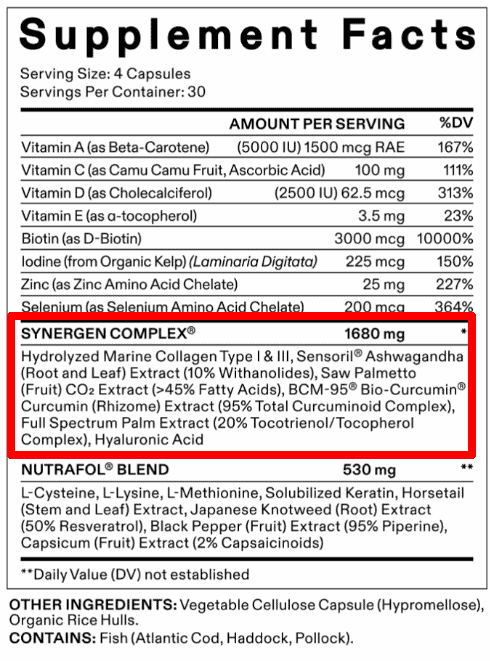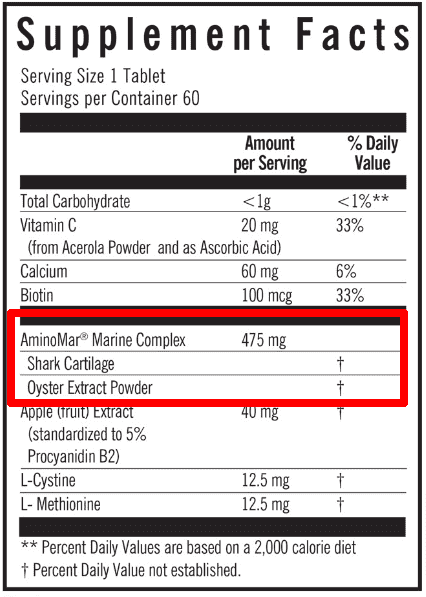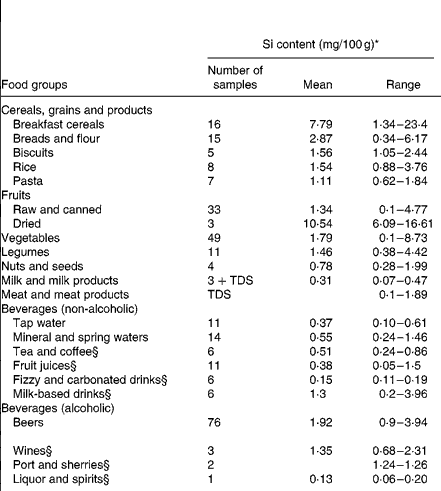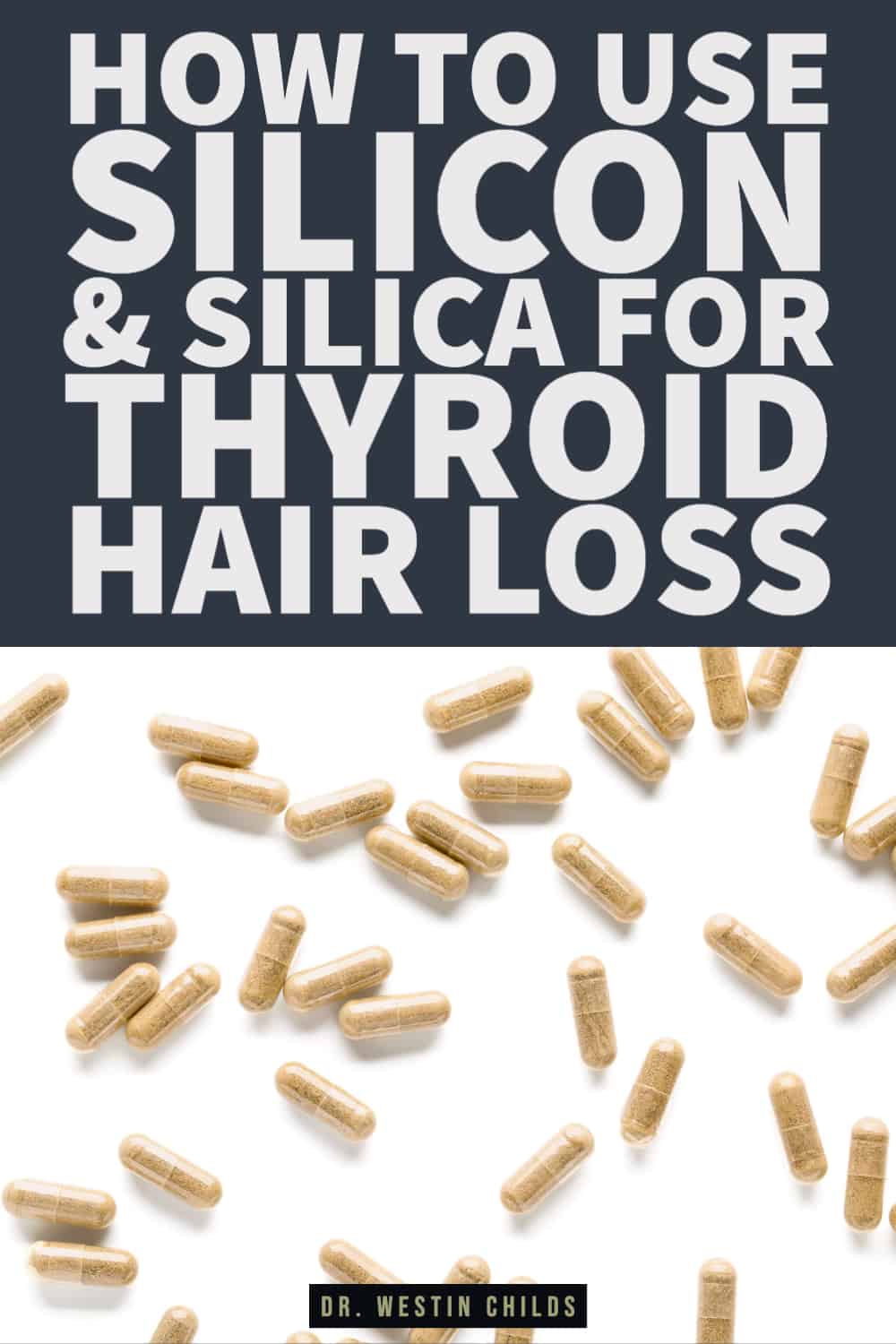Hair loss, it’s one of the most frustrating symptoms of low thyroid function and, probably, one of the most difficult to treat.
Aside from weight gain, it probably also carries with it the biggest psychological toll because it’s something you are aware of and look at every single day.
I’m not here to talk about bad news, though.
I’m here to talk about good news.
And the good news is that there is pretty much always something you can do to improve the quality and texture of your hair.
You may not be able to bring your head of hair back to what it looked like pre-thyroid disease, but you can definitely get it looking much better than where you are at right now.
Over the years, I’ve had the opportunity to help a lot of thyroid patients (thousands, at this point) and I’ve learned a thing or two along the way about hair loss.
Today I want to share with you more about one of my favorite supplements that can help with thyroid hair loss: silicon.
What is Silicon?
Silicon is the third most abundant trace element found in the human body and it is the second most abundant element present in the earth’s crust.
In other words, there’s a lot of silicon in your body and around you at all times.
Compared to other micronutrients and minerals, silicon doesn’t really get the attention that it deserves.
Part of this probably has to do with the fact that deficiency is so rare given that it’s all around us.
Humans come into contact with silicon on a daily basis from the foods that we eat and even metals that we come into contact with.
Because of this, there’s some debate as to whether or not it’s an essential or required nutrient.
An essential nutrient is something that we humans require for life.
Whether or not silicon is essential is not really relevant here because we are more interested in what happens if you aren’t getting enough of it.
To help us figure that out, we can look at where silicon is concentrated in the human body:
Silicon is found in every tissue but it’s most concentrated in the skin, hair, arteries, and nails (1).
From here we can make the educated assumption that when silicon levels are low, these tissues may suffer.
This leaves an opportunity for silicon supplementation to replace these low levels and, ultimately, help improve the health of your hair, skin, and nails.
DOWNLOAD FREE RESOURCES
Foods to Avoid if you Have Thyroid Problems:
I’ve found that these 10 foods cause the most problems for thyroid patients. Learn which foods you should avoid if you have thyroid disease of any type.
The Complete List of Thyroid Lab tests:
The list includes optimal ranges, normal ranges, and the complete list of tests you need to diagnose and manage thyroid disease correctly!
How Does it Help with Hair Loss, Skin Health, and Nail Health?
Compared to other supplements that are often used for hair, skin, and nails, silicon isn’t very well understood.
When you look at the studies, it’s pretty clear that this micronutrient helps hair texture and quality, but the exact mechanism for how it occurs is not well understood.
Here’s what we do know (or at least think we know):
It’s felt that silicon somehow helps other nutrients required for hair growth do their jobs more effectively.
This is important because many different nutrients are required at optimal levels for your hair to grow including vitamin A, vitamin B, vitamin C, vitamin D, vitamin E, iron, selenium, and zinc.
And if you’ve been reading any of my other articles, then you know that thyroid patients experience suboptimal rates of these vitamins and minerals at much higher rates than the general public.
It’s for this reason that just taking a single vitamin or nutrient is usually not very helpful for thyroid-related hair loss (think biotin supplements).
Silicon supplementation, on the other hand, may help solve this problem (at least partly) by enhancing the effectiveness of whatever amount of these nutrients that you have in your body.
In addition to this effect, silicon itself has a direct impact on hair function as well.
Silicon is concentrated in the outer shaft of the hair and it has been shown that hair with higher silicon content tends to fall out less and appears to have more shine, luster, and brightness.
This is probably, at least partly, why taking silicon supplements as a thyroid patient can be so effective for thyroid-related hair loss.
But it also has additional impacts on what I refer to as the beauty tissues, as well.
One of these tissues is your skin.
As you get older, you can expect that the elastin and collagen content of your skin will decline.
This is part of life and will happen pretty much no matter what you do.
While you can’t control this eventual decline what you can do is slow it down.
Collagen fibers are primarily responsible for the integrity of your skin.
As collagen declines, your skin will start to sag and form wrinkles.

This makes preserving collagen an important part of keeping your skin healthy.
But another important element of the aging process is the loss of plump or full-looking skin.
This has to do with collagen but it also has to do with the water content of compounds called glycosaminoglycans.
These compounds, GAGs for short, can hold up to 1,000 times their weight in water which helps provide moisture and structure to the skin.
Silicon helps to stabilize the glycosaminoglycan network under the skin which maintains skin integrity and function.
Finally, silicon also has a beneficial effect on your nail health.
Silicon is one of the predominant minerals found in your nails and we know that silicon deficiency results in brittle and flimsy nails.
Nail quality and health also have an impact on your ability to fight off nail infections.
The bottom line? There are a handful of ingredients and supplements which have actually been shown to positively impact hair, skin, and nails, and silicon is one of those.
The question is not whether or not it helps, but how can you get more of it.
The Problem with Getting Silicon Into Your Body
When you look at the most popular hair loss supplements, you will find that most of them have one thing in common:
They almost all contain silicon in one form or another.
You probably just didn’t realize it because silicon comes in a lot of different forms, both naturally occurring and synthetic.
Let me give you a few examples to drive this home:
- Nutrofol – It contains a lot of ingredients including a proprietary blend of hydrolyzed marine collagen and a proprietary blend of solubilized keratin and horsetail extract. These are sources of silicon. When you look at the size of their proprietary blends, they make up a combined 2,210mg of the total dose (which is the majority) when you consider that each capsule usually contains around 500-750mg worth of ingredients and the total dose is 4 capsules.
- Viviscal – Viviscal also includes a lot of additional ingredients including a marine complex of shark cartilage and oyster extract. It also contains naturally occurring silicon in the form of horsetail extract. The dosing of the marine complex and the horsetail extract make up a combined dose of 486.7mg which, again, is the majority of the ingredients in their 1 capsule/serving dose.


You can jazz up your hair, skin, and nail supplements with additional ingredients, but at the end of the day, it looks like silicon is doing the majority of the work.
Having said all of this, there’s one big problem with silicon that needs to be overcome if you want it to do its job:
Absorption.
It turns out that getting silicon in the form of supplements (either naturally occurring or synthetic) is the easy part.
The hard part is getting that silicon into your body.
The reason is something called polymerization.
Polymerization is the process in which small molecules chemically combine with one another to form a chainlike network.
And this is something that happens to silicon.
When you look at the bioavailability of various silicon formulations, the absorption rate varies from 1% to 50% (2).

In other words, you can take silicon in some forms and only absorb 1% of the total amount!
This is why there are so many different silicon formulations. To try and prevent this polymerization from occurring.
Changing the form and source of silicon are all things that can potentially help this process occur more effectively.
Let’s talk about some of these formulations and which ones tend to be better absorbed than others.
Sources of Silicon:
#1. Natural Sources
Food sources of silicon represent the #1 source for humans and typically come in silicic acid, silicon dioxide (silica), and silicates.
Unfortunately, these formulations are not very easily absorbed as evidenced by the fact that many thyroid patients (and people in general) seem to not be getting enough silicon from their diets.
Plants have the ability to absorb silicon as silicic acid which is why many plant-based foods tend to have higher concentrations of silicon and is the reason that the #1 source of dietary silicon is cereals (not a great option for thyroid patients).
Silicon is naturally found in the following (3):
- Cereals (barley, oats, wheat, rice bran)
- Rice
- Fruits (apples and bananas)
- Vegetables (carrot, potato, green beans)
- Nuts
- Dried fruits
- Beer
Silicon can also naturally be found in substances such as:
- Horsetail (4) (a plant with the highest concentration of silica at about 10-25% of its dry weight)
- Bamboo (5)
- Marine extracts (6)
- Diatomaceous earth (7)

These natural sources all suffer from the same issue:
Poor absorption and poor availability.
You can attempt to overcome this issue by simply increasing the dose of the ingredient, though, but as you increase the dose of silicon you run the risk of polymerization.
As a result, brute forcing higher doses is not always the best answer.
It turns out, though, that there are other methods that work better which we will discuss below.
#2. Choline Stabilized Ortho-silicic acid
One way to bypass the issue of bioavailability is to provide silicon in a different form.
Choline-stabilized ortho-silicic acid is one of these forms (8)!
It has a long and confusing name, but don’t let that fool you.
Ortho-silicic acid is one of the most bioavailable forms of silicon available to both humans and animals.
It’s also the form that plants take up silicon before altering its form for utilization.
The benefit of obtaining silicon in this form is that it’s highly dissolvable in water and that it prevents the polymerization issue that I mentioned above.
This allows you to obtain more silicon while also using smaller quantities.
When comparing the absorption of various forms of silicon, the highest is MMST at 64%(which we will discuss in a second) (9), followed by green beans at 44%, followed by orthosilicic acid (OSA) at 43%, followed by choline-stabilized orthosilicic acid (ChOSA) at 17%, followed by bananas at 4%.
One thing worth noting here is that even though you can absorb a relatively high amount of silicon from a plant source such as green beans, doesn’t mean you can obtain all of the silicon you need (or want) from that source.
Here’s what I mean:
Plants do contain some silicon, but that dose is relatively small.
And when we are talking about the benefits of silicon (the point of this article), the dosing needs to be much higher.
This is where supplements come in.
They can provide you with a concentrated dose of silicon, more than what you could get through your diet.
You can still get a lot through your diet, but it’s not always practical to eat 1-2 cups of green beans per day which would provide you with around 7mg of silica.
Generally, the target dose for supplementation is around 10mg or so, which means you’d need to consume around 1.5 cups of green beans every day to get silica (remember, green beans are an exception as they contain abnormally high amounts of highly absorbed silicon (10)).
Taking the right supplements allows you to get higher doses of silicon that would otherwise be impractical to get from your diet, without the issue of polymerization that occurs with most natural sources.
This is one of the main reasons that I initially formulated Thyroid Hair Regrowth Complex with silicon in the form of choline-stabilized orthosilicic acid.
That particular supplement has been used by thousands of thyroid patients with great success but it didn’t work 100% for everyone.
And that may be because there are other versions of silicon that are better absorbed…
#3. Monomethylsilanetriol
Out of all available forms (except beer), the most absorbable form of silicon is methylsilanetriol, or MMST for short.
This isn’t just my opinion, it’s based on absorption studies by researchers who have concluded the same thing (11).
This version of silicon is both highly absorbed and highly dissolvable (much like OSA), making it the ideal version to take as a supplement.
MMST has been around for decades and has been found to be both safe and effective (12).
Through testing (and research), I’ve found MMST to be better for thyroid patients compared to Ch-OSA.
It’s not that the other version doesn’t work, it’s just that I’ve seen better results with MMST.
For this reason, I’ve reformulated Thyroid Hair Regrowth Complex to contain MMST.
How Much Silicon Should You Consume Each Day?
Believe it or not, there isn’t a widespread consensus on how much silicon humans should consume each day.
We know and understand the importance of silicon, but there are relatively few studies that have attempted to suggest just how much humans need.
Like other nutrients I’ve discussed before, there seems to be a ‘good enough’ dose as well as an ‘optimal dose’.
The good enough dose is one that provides you with the bare minimum. Getting this much means that you won’t have any gross deficiencies, but it doesn’t mean you will experience the benefits you are looking for either.
The optimal dose is a higher dose and many of the benefits you want will be experienced when you reach this threshold.
Here’s how we can estimate these ranges:
Based on the average dietary intake, it’s been proposed that a good enough range for silicon is somewhere between 10 and 25mg taken each day (13).
Having said that, we also know that many of the benefits patients are looking for become much more evident at higher doses, usually around the 25mg/day range.
For this reason, I think a good total silicon dose to aim for is at least 25mg per day (14).
This is just the lower end, though, because some populations consume doses that are much higher and don’t seem to have any complications.
This value takes into account the combination that you receive from both foods and supplements, though.
And the amount that you get from your diet will vary quite dramatically based on food preferences and any dietary restrictions that you follow.
For instance, diets that are not high in plants (such as keto and carnivore) will naturally contain much less silicon.
This isn’t necessarily a problem but it does mean that this should be taken into account when you supplement.
In terms of supplements, a good dose of silicon is around 10mg taken every day.
If you take a highly absorbable version, then you know you are getting at least a consistent daily amount that can then be added to whatever amount you get from your diet.
If you are specifically trying to treat something like thyroid hair loss, then taking up to 20mg per day of silicon may make more sense.
Wrapping it Up
Using silicon is an easy way to improve hair, skin, and nail health in thyroid patients.
The key to getting the results you want is all about getting it in the right form and at the right dose.
This can be accomplished in a variety of ways including through supplements and foods.
In terms of supplements, there are many options available but I’ve found that Ch-OSA and MMST tend to work best for thyroid patients.
If you opt to get your choline from foods, just make sure that you are consistent in eating those foods that are high in silicon each and every day.
Because of the life cycle of the hair follicle, it takes a solid 6-8 weeks of daily consumption before you start to see results.
Now I want to hear from you:
Were you aware of the importance that silicon plays in hair, skin, and nail health?
Have you tried or used other hair support supplements in the past? Did they work for you?
Are you planning on trying silica or silicon to improve your beauty proteins?
Leave your questions or comments below!









I just did the bloodwork and my TSH is virtually zero and I was ordered to get the ultrasound. I have no symptoms. No weight gain or loss. I’m afraid to start taking any medication if I feel fine. What am I missing?
Hi Gordana,
Well, I wouldn’t say you are missing anything yet. You should get further tests to see if it was simply a lab error.
Where do I find your silicon supplement?
Hi Charlene,
You can find it here: https://www.restartmed.com/product/thyroid-hair-regrowth-complex/
Dr. Kevran also made a water soluble extract of horsetail that is absorbed well. I’ve tried Florasil and it works well. Unfortunately it contains corn syrup solids
Hi Steve,
I didn’t run across a water-soluble extract of horsetail during my research. Is that a trademarked ingredient or are you aware of any studies which show that it’s more readily absorbed compared to regular horsetail extract? In general, horsetail extract is not absorbed well compared to other forms.
Hi Dr Childs. This is of particular interest to me. My hair has been thinning the past year and a half and is now really noticeable. My dr prescribes T4/ 50 daily and T3/5 daily. Last week they biopsied during endoscopy and I have a fungal infection. I’m on flucanazole and my scalp is really itchy. I’m afraid it means more hair loss from the medication.
As for the choline: I’ve red where too much (and I don’t know what that means) can up your risks of other heath issues.
How safe is choline and do you feel inositol also should be taken? As it is I take the rest of the required suggestions for thyroid hair loss.
Thank you for your dedication.
Hi Janice,
It’s possible to get too much of any nutrient, even ones that normally are very helpful. I can’t say that I’ve run into any literature suggesting that choline is uniquely harmful, though. If you have any data that you want to share, I can take a look at it. Based on my experience, the doses of choline, silica, and inositol that I recommend are very safe.
I have been looking for a solution for my thyroid hair loss for years now. My doctors just seem to largely ignore my complaints about hair loss. They ask me if I’ve taken biotin supplements. I know that it’s directly related to the Synthroid that I’m taking. The higher the dosage, the more hair loss I have. It’s so frustrating! I’m not crazy about taking another supplement. What studies have you done on the effectiveness of silicon?
Hi Marti,
It’s highly unlikely that you will be able to find success in stopping/preventing your hair loss without a lot of trial and error with supplements and even thyroid medications, just as a friendly FYI.
Like every article I write, I include references to the claims that I make in the article itself. You will see the numbered text next to various statements and claims throughout the article and you can reference the number to a specific study at the bottom of the article under the tab “View all references”. This article has 14 references to various studies about silicon that you can read more about if you’d like.
In regard to hair loss, I would also recommend reading these resources for further information:
https://www.restartmed.com/thyroid-hair-loss/
https://www.restartmed.com/treatments-for-thyroid-hair-loss/
I am not aware of the importance of silicon. I have never tried any supplements of silicon. I plan to give your formula a try. I am currently taking 50 mcg of levothyroxine daily at night.
Hi Susan,
That sounds like a good plan. If it’s for hair loss, you should also make sure to keep an eye on your iron status as well.
I understand that you need to stop biotin sometime before thyroid labs as it can interfere (I’ve heard anywhere from 2 days to two weeks). Since your formula has biotin will stopping it for possibly two weeks every few months change the effects?
Hi Lynn,
You only need to stop taking biotin 2 days prior to when you get your labs drawn. I’ve written about how biotin interferes with thyroid lab testing here: https://www.restartmed.com/biotin-and-thyroid/
Hi Dr. Childs
I really enjoy reading/watching your well informed information!
I was researching silicon/ horsetail/ bamboo and it cautioned users to be aware of a few things: horsetail can be antagonistic to Thiamine. May lower hypothyroid levels further. Those were the main issues I had read that concerned me. I have had RAI for Graves 30 years ago. Not sure if that is because of silica, or specific herbs.
Any thoughts?? Thanks!!
Do you need to stop the silicon for a few days before thyroid lab work like you need to do with biotin?
Hi Lulu,
You do not.
I had a very bad experience taking bamboo shoots in a hair growth supplement. The bamboo shoots caused my TSH to go up A LOT. Are bamboo shoots a goitrogen? What about horsetail and saw palmetto? I was very upset to have to stop taking the bamboo shoots because they had a positive effect on my hair but unfortunately they raised my TSH so much that I had no choice but to stop taking them. What is a good alternative??? Thank you!
Hi Lalena,
Yes, bamboo shoots do contain goitrogenic compounds: https://pubmed.ncbi.nlm.nih.gov/31838178/
You can use MMST as a source of silicon: https://www.restartmed.com/product/thyroid-hair-regrowth-complex/
Hello Dr.,
I would really like to get my hair back! I’m wondering if MMST contains any iodine or green bean derivatives since I have to avoid both of those. It looks like some formulations are made from plants like horsetail and bamboo and some are made from minerals. What are the minerals it’s made from? I can’t seem to find this info anywhere. Thanks!
Do you have a recommended supplement for silicon other than the hair regrowth complex? I already take a supplement with biotin but it doesn’t contain silicon. Wondering if there’s a supplement that’s just silicon that you recommend.
Hi Kristi,
I do not. In general, it’s quite difficult to take too much biotin and some people benefit from very high doses so it’s likely not to be an issue.